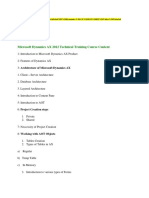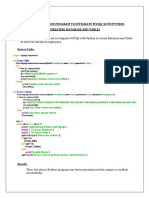Immutable String in Java - Javatpoint
Uploaded by
naasirkhader44Immutable String in Java - Javatpoint
Uploaded by
naasirkhader44Home Java Programs OOPs
Sponsored
Here Is What Full
Immutable Mouth Dental
String in Java
A String is an unavoidable type of variable
while writing any application program.
String references are used to store various
attributes like username, password, etc. In
Java, String objects are immutable.
Immutable simply means unmodifiable or
unchangeable.
Once String object is created its data or
state can't be changed but a new String
object is created.
Let's try to understand the concept of
immutability by the example given below:
ADVERTISEMENT
ADVERTISEMENT
Testimmutablestring.java
class Testimmutablestring{
public static void main(String args[]){
String s="Sachin";
s.concat(" Tendulkar");//concat() method appen
System.out.println(s);//will print Sachin becaus
Test it Now
Output:
Sachin
Now it can be understood by the diagram
given below. Here Sachin is not changed
but a new object is created with Sachin
Tendulkar. That is why String is known as
immutable.
As you can see in the above figure that
two objects are created but s reference
variable still refers to "Sachin" not to
"Sachin Tendulkar".
But if we explicitly assign it to the
reference variable, it will refer to "Sachin
Tendulkar" object.
For example:
Testimmutablestring1.java
1. class Testimmutablestring1{
2. public static void main(String args[]){
3. String s="Sachin";
4. s=s.concat(" Tendulkar");
5. System.out.println(s);
6. }
7. }
Test it Now
Output:
Sachin Tendulkar
In such a case, s points to the "Sachin
Tendulkar". Please notice that still Sachin
object is not modified.
Why String objects are immutable in
Java?
As Java uses the concept of String literal.
Suppose there are 5 reference variables,
all refer to one object "Sachin". If one
reference variable changes the value of the
object, it will be affected by all the
reference variables. That is why String
objects are immutable in Java.
Following are some features of String
which makes String objects immutable.
1. ClassLoader:
A ClassLoader in Java uses a String object
as an argument. Consider, if the String
object is modifiable, the value might be
changed and the class that is supposed to
be loaded might be different.
To avoid this kind of misinterpretation,
String is immutable.
2. Thread Safe:
As the String object is immutable we don't
have to take care of the synchronization
that is required while sharing an object
across multiple threads.
3. Security:
As we have seen in class loading,
immutable String objects avoid further
errors by loading the correct class. This
leads to making the application program
more secure. Consider an example of
banking software. The username and
password cannot be modified by any
intruder because String objects are
immutable. This can make the application
program more secure.
4. Heap Space:
The immutability of String helps to
minimize the usage in the heap memory.
When we try to declare a new String
object, the JVM checks whether the value
already exists in the String pool or not. If
it exists, the same value is assigned to the
new object. This feature allows Java to use
the heap space efficiently.
Why String class is Final in Java?
The reason behind the String class being
final is because no one can override the
methods of the String class. So that it can
provide the same features to the new
String objects as well as to the old ones.
← Prev Next →
For Videos Join Our Youtube
Youtube
Channel: Join Now
Feedback
Send your Feedback to
feedback@javatpoint.com
Help Others, Please Share
Learn Latest Tutorials
Splunk tutorial SPSS tutorial
Splunk SPSS
Swagger tutorial T-SQL tutorial
Swagger Transact-SQL
Tumblr tutorial React tutorial
Tumblr ReactJS
Regex tutorial
Regex Reinforcement
Learning
RxJS tutorial
R Programming RxJS
React Native Python Design
Patterns
Python Pillow Python Turtle
Keras tutorial
Keras
Preparation
Aptitude
Aptitude Reasoning
Verbal Ability
Verbal Ability Interview
Questions
Company
Questions
Trending Technologies
AWS Tutorial
Artificial AWS
Intelligence
Selenium tutorial Cloud Computing
Selenium Cloud Computing
Hadoop tutorial ReactJS Tutorial
Hadoop ReactJS
Data Science Angular 7
Git Tutorial
Blockchain Git
DevOps Tutorial
Machine Learning DevOps
B.Tech / MCA
DBMS tutorial
DBMS Data Structures
DAA tutorial Operating System
DAA Operating System
Computer Network Compiler Design
Computer Discrete
Organization Mathematics
Ethical Hacking
Ethical Hacking Computer Graphics
html tutorial
Software Web Technology
Engineering
Automata Tutorial
Cyber Security Automata
C++ tutorial
C Programming C++
Java tutorial
Java .Net
Python tutorial List of Programs
Python Programs
Control System Data Mining
Data Warehouse
⇧ SCROLL TO TOP
You might also like
- Running Head:: Describe The Uses of Waiting Line AnalysesNo ratings yetRunning Head:: Describe The Uses of Waiting Line Analyses6 pages
- Why String Is Immutable or Final in Java: Friday, October 1, 2010No ratings yetWhy String Is Immutable or Final in Java: Friday, October 1, 20102 pages
- Java String: Java String Class Provides A Lot of Methods To Perform Operations On String Such AsNo ratings yetJava String: Java String Class Provides A Lot of Methods To Perform Operations On String Such As27 pages
- Strings: Mutable Object - You Can Change The States and Fields After The Object IsNo ratings yetStrings: Mutable Object - You Can Change The States and Fields After The Object Is10 pages
- UNIT III - STRINGS, COLLECTIONS, AND JAVA 8 FEATURESNo ratings yetUNIT III - STRINGS, COLLECTIONS, AND JAVA 8 FEATURES52 pages
- Result Windows: Adobe Character Animator KEYBOARD SHORTCUTS - FOR WINDOWSNo ratings yetResult Windows: Adobe Character Animator KEYBOARD SHORTCUTS - FOR WINDOWS5 pages
- Using Big Data For Co-Innovation ProcessesNo ratings yetUsing Big Data For Co-Innovation Processes15 pages
- Technical: Microsoft Dynamics AX 2012 Technical Training Course ContentNo ratings yetTechnical: Microsoft Dynamics AX 2012 Technical Training Course Content22 pages
- Class 12 CS Practical Exercises - 2024 SQLNo ratings yetClass 12 CS Practical Exercises - 2024 SQL15 pages
- Mora: Extending The Capabilities of Sora in Video GenerationNo ratings yetMora: Extending The Capabilities of Sora in Video Generation9 pages
- (Ebook) Business-Friendly DSLs (MEAP Edition / Manning Early Access Program Version 9) by Meinte Boersma ISBN 9781617296475, 1617296473 - Download the full set of chapters carefully compiled100% (2)(Ebook) Business-Friendly DSLs (MEAP Edition / Manning Early Access Program Version 9) by Meinte Boersma ISBN 9781617296475, 1617296473 - Download the full set of chapters carefully compiled81 pages
- Lab Manual of Satellite Communication: Submitted by Ishita AggarwalNo ratings yetLab Manual of Satellite Communication: Submitted by Ishita Aggarwal40 pages
- (Ebook) AspectJ in Action: practical aspect-oriented programming by Ramnivas Laddad ISBN 9781930110939, 1930110936 download100% (2)(Ebook) AspectJ in Action: practical aspect-oriented programming by Ramnivas Laddad ISBN 9781930110939, 1930110936 download46 pages

























































































